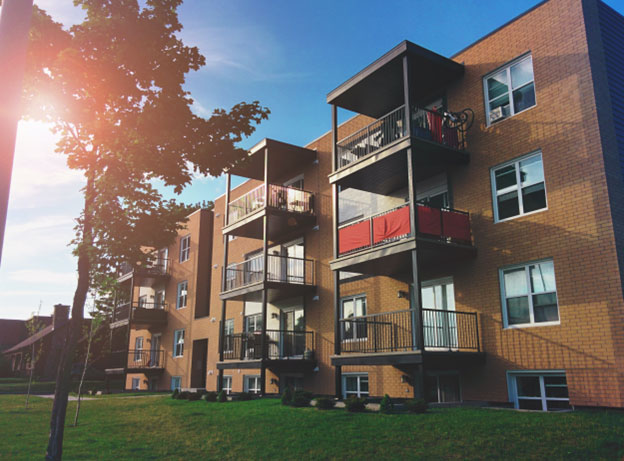Condo ownership can be a great way to get into the real estate market, but it’s important to consider all of the factors involved before investing. Condos offer distinct advantages and disadvantages that must be weighed carefully when making an investment decision.

Understanding Condo Investments
Are condos really a good investment? To answer that question, it's important to understand the unique aspects of condo ownership and the potential benefits and drawbacks.
Condos are typically part of a larger community or complex. These complexes can be as small as a few buildings or as large as an entire neighborhood. Each condo unit is owned individually, and the owners usually share in the expenses for common areas and amenities.
In terms of cost, condos generally have a lower purchase price than single-family homes. This makes them attractive to first-time homebuyers, young couples, and retirees. Condos also usually require less maintenance than single-family homes.
The competition in the condo market can be fierce, especially in larger cities. This is why it’s important to do your research before investing. You need to understand the local market and make sure you are buying a unit that will appreciate over time.
How To Start Investing In Condos
Here are some tips on how to get started investing in condos:
Do Your Research – The first step is to do your research and understand the local real estate market. Look at condo listings, attend open houses, and talk to real estate agents.
Find The Right Location – Location is key when it comes to investing in condos. Make sure you choose a neighborhood or area that has good resale potential and will appreciate over time.
Get Pre-Approved For A Mortgage – Before you start shopping for a condo, get pre-approved for a mortgage. This will ensure that you have the funds available to purchase the property.
Understand The HOA Fees – Condos usually come with Homeowners Association (HOA) fees that cover common areas and amenities. Make sure you understand these fees and how they affect your budget.
Investigate The Property – Before investing, make sure you investigate the property thoroughly. Check for any potential problems and ask questions about the HOA, building code violations, or any other issues that could affect your investment.
Pros of Investing in Condos
Investing in condos offers several advantages that make it a lucrative option for real estate investors. One of the primary benefits is the lower entry costs compared to single-family homes. With condos typically being more affordable, it allows investors to enter the real estate market with a smaller initial investment.
Another advantage is the potential for rental income. Condos are often in high demand, particularly in urban areas, making them an attractive choice for tenants. By renting out individual units, investors can generate a steady stream of rental income, providing them with a passive income source.
Additionally, condos often come with attractive amenities that can enhance their appeal to both tenants and potential buyers. From fitness centers and swimming pools to community spaces and management companies, these amenities contribute to higher rental rates and increased cash flow.
Furthermore, the demand for condos is generally high, as they cater to various demographics, including young professionals and downsizing homeowners. This demand, coupled with the potential for appreciation, can lead to a favorable return on investment.
Condos also offer the advantage of lower maintenance costs compared to single-family homes. With exterior maintenance and common area upkeep typically covered by the condo association, investors can avoid the hassle and expenses associated with these tasks.

Cons of Investing in Condos
While condos can offer many advantages as an investment, it's important to consider the potential drawbacks. One of the main challenges with condo investments is the presence of homeowners association (HOA) fees. These fees can vary significantly and impact the overall return on investment. Additionally, investors have limited control over the management decisions made by the condo association, which can significantly impact the property's value and rental income.
Furthermore, the condo market can be volatile, especially in areas with a high concentration of condos. Fluctuations in demand and market conditions can affect the value and desirability of a condo unit, potentially leading to a slower rate of appreciation or difficulty in finding tenants.
Tenant turnover is another concern when it comes to investing in condos. Unlike single-family homes, condos often attract tenants who are more likely to move frequently, resulting in higher tenant turnover and the associated costs of finding new tenants.
Resale limitations may also be a factor to consider. Condo owners may face challenges when it comes to selling their units due to factors such as strict rules and regulations, limited buyer pool, and dependency on the overall market conditions.
Finally, conflicts within the condo community can arise. Disputes over maintenance responsibilities shared amenities, and decision-making processes can create tension among condo owners, potentially affecting the investment and overall enjoyment of the property.
Factors to Consider
Investing in condos can be a lucrative venture, providing a source of rental income and potential appreciation over time. However, there are several factors that should be carefully considered before making a decision. Let's explore these factors to ensure that you make an informed investment choice.
An important factor to consider is risk tolerance. For some investors, a condo may be a low-risk and relatively stable asset that can generate steady rental income over time. On the other hand, others may view condos as too risky due to their susceptibility to market conditions and fluctuations in real estate prices.
If an investor is comfortable with the risks associated with condo investments, a thorough analysis of the market should be conducted, as well as an assessment of the HOA rules and regulations. Additionally, it's essential to examine the potential for appreciation and rental income, as well as the impact of tenant turnover on cash flow.
Moreover, investors should evaluate the condition of a condo unit and any associated upgrades or renovations that may be necessary to ensure a successful rental. Understanding these factors can help investors make an informed decision on whether condos are a good investment for them.
Location and Market Trends
Location plays a crucial role in determining the success of a condo investment. When considering investing in a condo, it's essential to thoroughly research the market trends, demand, and growth potential in specific areas.
Choosing a condo in a desirable location can significantly impact the appreciation potential of your investment. Look for areas that are experiencing growth and have a high demand for housing. Consider factors such as proximity to employment centers, amenities, transportation, and schools.
Furthermore, understanding market trends in the area you're considering is essential. Analyze historical data and forecasted growth rates to determine whether the market is favorable for investment. Look for areas with a stable or increasing median price for condos, indicating a healthy and growing real estate market.

Additionally, consider the rental demand in the location. Look at vacancy rates, rental rates, and the overall rental market. Areas with high demand for rental properties can provide a steady source of rental income and increase the potential return on your investment.
Financial Considerations
When considering whether condos are a good investment, it is important to take into account the various financial aspects associated with purchasing and owning a condo.
Firstly, let's look at the upfront costs. Condo prices can vary greatly depending on location, size, and amenities offered. It's essential to research purchase prices in the area you're interested in and compare them to your budget. Additionally, you may need to factor in closing costs and any association fees associated with the condo building.
Mortgage financing is another crucial consideration. Interest rates, loan terms, and down payment requirements should be analyzed to determine the financial implications of purchasing a condo. It's always advisable to shop around and get pre-approved for a mortgage to understand your borrowing capacity.
Rental income potential is an attractive aspect of investing in condos. If you plan to rent out the unit, researching the local rental market is essential. Look at rental rates for similar units in the area and consider the demand for rental properties. Calculating potential rental income can help you determine the cash flow and return on investment.
Lastly, don't forget to account for ongoing expenses. Property taxes, insurance, and monthly maintenance fees are common financial obligations for condo owners. These expenses can vary depending on the size and location of the condo. It's crucial to factor in these costs to understand the true financial commitment of owning a condo.
Risk Management and Due Diligence
Investing in condos requires careful risk management and due diligence before making any commitments. Thorough research and analysis are crucial to ensure that your investment aligns with your financial goals and expectations.
One of the primary considerations is the condition of the property. It's essential to thoroughly inspect the condo before purchasing to identify any potential maintenance or repair costs. Understanding the condition of the unit can help you evaluate the overall financial viability of the investment.
In addition, you must carefully review the homeowners association (HOA) regulations and bylaws. These rules can significantly impact your ability to use the property as you wish. Be aware of any restrictions on renting out the unit, short-term rentals, or any other limitations that may affect your investment plans.
Furthermore, it's important to consult with a real estate attorney to ensure that all legal considerations are taken into account. This includes reviewing contracts, title searches, and any other legal documentation relevant to the purchase.
Conclusion
In conclusion, investing in condos can be a viable option for those seeking to enter the real estate market. However, it requires careful examination of various factors and due diligence to ensure a successful investment.

On the positive side, condos can provide an attractive source of rental income and the potential for long-term appreciation. They offer a more affordable entry into real estate compared to single-family homes and often come with appealing amenities that can attract tenants.
However, it is crucial to conduct thorough research on the location and market trends to make an informed decision. Carefully assess factors such as proximity to public transportation, employment opportunities, and the state of the local real estate market.
Financial considerations, including purchase prices, monthly maintenance fees, the potential return on investment, and cash flow, should also be evaluated. It is essential to calculate the numbers and assess whether the investment is financially viable.
Risk management is key, as condos come with potential downsides. Engage with professionals such as real estate agents, property managers, or financial advisors to gain expertise and guidance. They can help navigate the complexities of the condo market and provide personalized advice.
Ultimately, investing in condos can be a good decision if proper research, analysis, and risk management are employed. Taking the time to evaluate individual circumstances and seeking professional guidance will increase the chances of a successful investment.
Frequently Asked Questions:
Investment property can be a great way to build wealth over time. But before you commit to condo ownership, it's important to understand the financial implications of the investment. Here are some common questions about condo investing.
Can condos provide a good return on investment?
Yes, condos can be a good investment option. They offer the potential for both rental income and long-term appreciation. Compared to single-family homes, condos provide a more affordable entry into the real estate market, making them an attractive option for investors. Additionally, condos often come with amenities like fitness centers and community spaces, which can make them appealing to tenants and help maintain rental demand.
Are condos better for rental income or resale value?
Condos can be suitable as a rental property or for its resale value, depending on the market conditions and investor preferences. Rental income can provide a steady stream of cash flow, especially in areas with high demand for rental properties. On the other hand, condos also have the potential for appreciation over time, which can result in a profitable sale in the future. It is essential to evaluate current market trends, rental rates, and potential resale values to determine the best approach for your investment goals.
What should I consider when evaluating HOA fees?
When evaluating HOA fees, it is important to understand what is included in the fees and what amenities or services they cover. Consider the value and frequency of these services, such as exterior maintenance, snow removal, or the upkeep of common areas. Also, look at the financial health of the condo association, as higher HOA fees might indicate better maintenance and management of the property. Evaluate the current and past budgets, reserve funds, and any pending special assessments to assess the overall financial stability of the association.

How do I assess the financial health of a condo association?
To assess the financial health of a condo association, review its financial statements, including the budget, income statement, and balance sheet. Look for a well-maintained budget that covers regular expenses and has sufficient reserves for maintenance and unexpected costs. Also, consider any pending or future special assessments that may affect your investment. If possible, review the association's bylaws and minutes of past meetings to get insights into its management practices and decision-making processes.
Are there specific factors to consider when investing in vacation condos?
When investing in vacation condos, there are several factors to consider. Location is crucial, as tourists tend to gravitate towards popular destinations with attractive amenities and easy access to attractions. Evaluate the rental potential, including the demand for short-term rentals, average rental rates, and occupancy rates in the area.
Additionally, consider the local regulations on vacation rentals, as some areas may have restrictions or requirements that could impact your investment. It is also important to assess the ongoing maintenance and management of the condo, as you may not be on-site to address issues personally. Working with a property management company can help ensure that your vacation condo investment is well-maintained and profitable.


